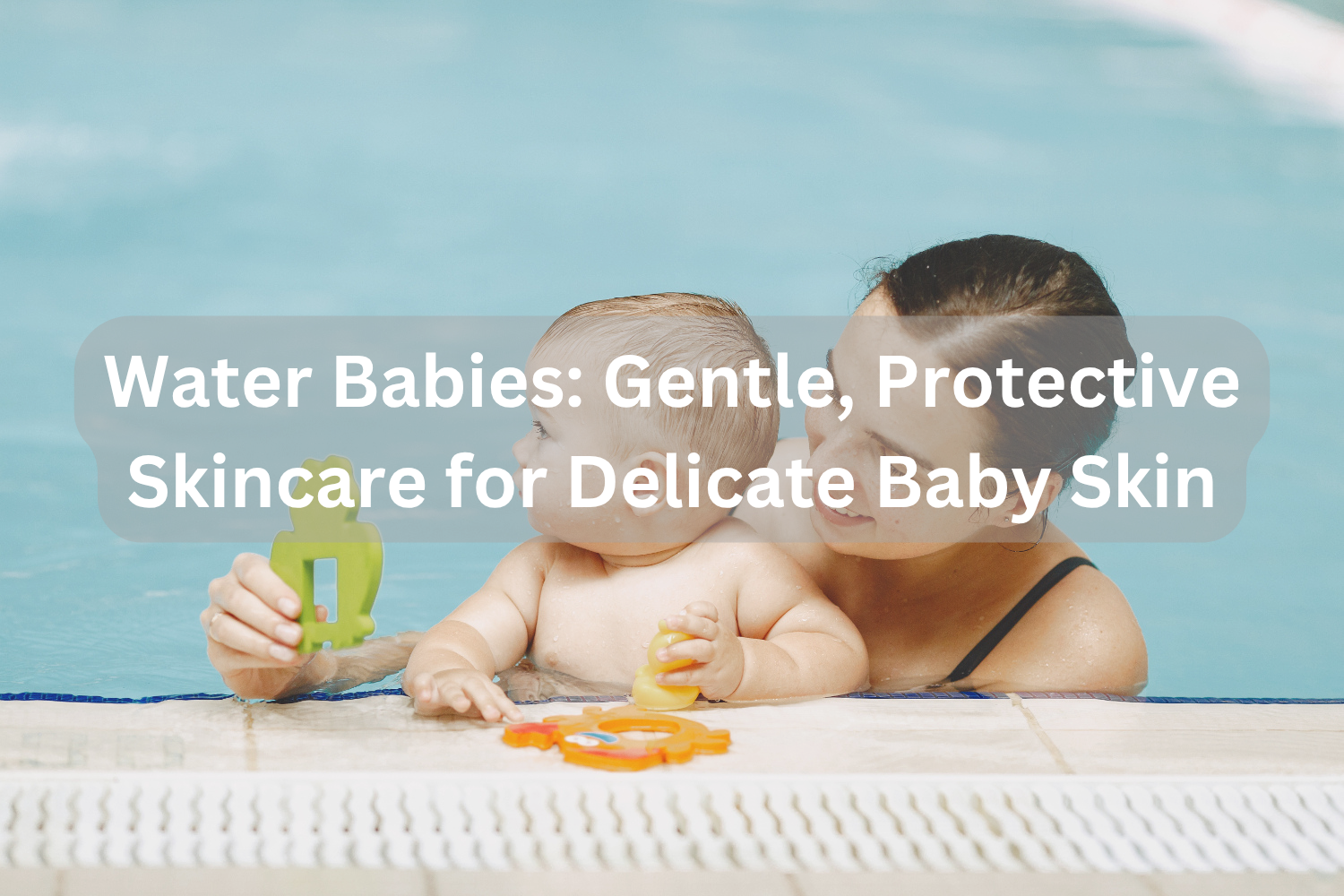Every parent wants the best baby skincare when it’s all about their little one. After all baby skin is very delicate, much more so than adult skin, therefore, it’s delicate skin that requires a delicate approach. In this article we look at everything you need to care for baby skin and what skincare products are right to protect and keep baby skin soft and healthy.
Understanding Baby Skin: What Makes It So Delicate?
Both adult and baby skin are much thinner and more sensitive than other types of skin. But it’s still developing a protective wall that blocks irritants, allergens and disease causing bacteria from room. Babies skin is higher water content, meaning it is more prone to dehydration and sensitivity. Their skin gets dry much faster than ours because their sebaceous glands, the glands that produce the natural oils that protect your skin, aren’t fully developed yet.
That’s because baby skin is also more vulnerable to the environment: temperature changes, humidity, and even the products we already use around our babies. That’s why it’s particularly important for skincare for babies to be so gentle and also free of any potential irritants that could disrupt their sensitive skin’s balance.
Why Gentle Ingredients Matter
Products that we pick to put on baby skin should be as natural and gentle as can be. Alcohol, preservatives like parabens and sulfates, and synthetic fragrances can irritate sensitive skin and cause you to become dry, and/or develop rashes and even allergic reactions. These ingredients are a special threat to babies because their filtering system works much more slowly and their skin absorbs chemicals much more easily than adult skin does.
It’s good to choose products that have simple, natural ingredients such as chamomile, calendula, aloe vera, and coconut oil. These ingredients offer moisture, quiesce the skin’s inflammation and help facilitate the skin’s natural healing process. The easier and more natural the formula, the better for your baby.
What Are “Water Babies” in Skincare?
But one term seems too well known nowadays: Water Baby. The term hints at using unadulterated, hydrating ingredients that comforting delicate skin without irritating it. They are normally free of horrible chemicals and are made keeping sensitivity in mind, which means these products can even take care of newborn as well!
It’s good news for babies, who can get some benefit out of water based skincare products without clogging up their skin with a bunch of heavy oils, pure poison, and other random chemicals. These are lightweight products that facilitate free breathings of the skin and feel refreshed, absorbing essential nutrition without irritation.
The Role of Water in Baby Skincare
The basis of gentle baby skincare is water. This is a mild, neutral ingredient that doesn’t irk or add any harshness while hydrating. Water is a basic material in many baby products and this is because the water helps to help deliver other great ingredients into the form that the skin can easily absorb.
For example, lotion and cream water based products are awesome to hydrate your skin without clogging the pores and breakouts. In general, they also tend to be less greasy, and that’s important for babies with sensitive skin that may be prone to irritation. Waterbase products can also include glycerin or hyaluronic acid, which hold a reputation for preserving moisture and keeping skin (soft and) smooth.
Choosing the Right Baby Skincare Products
When choosing skincare products for your baby there are so many to choose from, so it can be daunting. The best method is to try and find easy, natural ingredients that aren’t going to cause you irritation.
Reading labels is crucial. Buy only products that do not contain unnecessary additives, for example artificial fragrances, artificial colors, and parabens. Check for products “hypoallergenic,” “fragrance free,” and “dermatologist tested.” Calendula, chamomile, shea butter and aloe vera just make sense in terms of soothing and protecting baby skin. Also ideal to prevent the irritating effects on baby skin are products with a pH level very close to that of baby’s skin (around 5.5).
Benefits of Hypoallergenic Baby Skincare Products
With hypoallergenic products, the chance of upsetting babies with sensitive skin is minimized. Rigorous testing ensures these products don’t contain the common allergens such as nuts, soy, or synthetic fragrances. Pursuing hypoallergenic skincare products is your baby’s third line of defense against skin responses, particularly if they are touchy.
Some of the more popular hypoallergenic ingredients include aloe vera, oat extract, coconut oil, sunflower seed oil, and so much more! It’s filled with these soother ingredients that are less likely to irritated sensitive skin. This helps to strengthen the skin barrier–keeping your moisture in and irritants out.
Moisturizing Baby Skin: The Importance of Hydration
One of the key things to keep in mind to maintain baby skin healthy is hydration. Because babies lose moisture from their skin more quickly than adults, they can become dry and sensitive. For a good moisturizer to help lock in hydration and keep the skin soft should be part of every baby’s skincare routine.
Fragrance-free, hypoallergenic moisturizers such as shea butter, glycerin and jojoba oil will allow for long lasting hydration but won’t clog your pores. When the skin is still wet from a bath, use moisturizer, as such, helps seal in the moisture.
Sunscreen for Babies: Protecting Baby Skin Outdoors
Delicate baby skin is damaged with only a short period of sun. The good news is that babies who are outside for any length of time need — and deserve — to be protected with sunscreen, so, why not? Look for a mineral based sunscreen that contains zinc oxide, or titanium dioxide and these help form a physical barrier blocking UV rays, rather than absorbing them.
Reapply sunscreen generously every two hours, even on cloudy days, to your baby’s exposed skin if he’s outside. The widely used mineral sunscreens are considered generally safer and less irritating than chemical sunscreens, making them the best bets for baby skin.
Bathing Babies: Best Practices for Gentle Cleaning
Baby skincare includes bathing, and it is best to make it simple. Daily baths aren’t needed for babies, and frequent bathing strips your baby’s skin of natural oils. Sometimes, the amount of natural oil on your baby’s skin may be too overpowering, causing the skin to become overwhelmed, so try to bathe them a few (two to three) times a week with lukewarm water and a gentle, unscented cleanser.
Scrubbing isn’t allowed during the bath, so use a soft wash cloth to gently clean baby’s skin. After bathing, pat your baby dry and not rub to avoid irritation. Right after a bath, apply a gentle moisturizer to help keep you and your skin nice and soft.
Common Baby Skin Conditions and How to Address Them
Baby skin is more prone to conditions such as diaper rash, eczema and cradle cap. Any moisture can cause diaper rash and is often the result of prolonged diaper contact, thus preventing diaper rash including changing diapers frequently and applying a barrier cream. A good cream that will soothe and protect irritated skin to help prevent eczema is one that contains colloidal oatmeal.
A common scalp condition is cradle cap which can be treated by most gentle shampoos and light brushing to remove scales. If skin conditions persist or get worse consult with a pediatrician to get advice on how to handle these safely.
How to Handle Baby Skin Allergies and Sensitivities
All babies aren’t immune to developing skin allergies and sensitivities to different products. Allergic reaction could be from you using a product and you notice redness, itching or rashes. If you use these products and develop these symptoms, immediately stop using the product and rinse your baby’s skin with lukewarm water to remove any residue. If symptoms do not go away or get worse, see a pediatrician to find out what might be causing the reaction.
Building a Simple and Safe Baby Skincare Routine
A baby’s skincare routine doesn’t have to be fancy. For outdoor protection start with a gentle cleanser, soothing moisturizer, and a mineral based sunscreen. Baby skincare is usually less is more. You’ll also reduce any irritation and make it simpler to keep, by keeping the routine minimal.
During bath time, gentle cleanse can be part of a typical daily routine together with a moisturizing cream to keep skin hydrated. Whenever you’re going outdoors, apply a mild layer of mineral sunscreen over areas of skin that are exposed to the sun.
The Importance of Testing Products First
A good practice is to patch test new products to a small portion of the skin, such as the inside back of the hand, before making it an even wider application. How soon do you wait before deciding if irritation developed? This is particularly important for sensitive skinned babies who may mess up with unexpected reactions.
Conclusion
Taking care of your baby’s very sensitive skin means picking what is kind to your baby, gentle and high quality products and a simple, mindful skincare routine. Knowing that baby skin needs something different from adult needs, opting for a product with natural and hypoallergenic ingredients will help keep your baby’s skin soft and protected.
Frequently Asked Questions
Q: How often should I bathe my baby?
A: Bathing 2-3 times a week is usually enough for newborns, as frequent washing can strip the skin of essential oils.
Q: What should I do if my baby has dry skin?
A: Apply a fragrance-free, hypoallergenic moisturizer after bath time to help lock in moisture and keep the skin soft.
Q: Can I use regular sunscreen on my baby?
A: It’s best to use mineral-based sunscreen specifically designed for babies to avoid potential irritants.
Q: How can I prevent diaper rash?
A: Change diapers frequently and use a barrier cream to protect your baby’s skin from moisture and irritation.
Q: Are baby wipes safe for everyday use?
A: Yes, but choose alcohol-free, fragrance-free wipes to avoid irritation and keep your baby’s skin comfortable.





